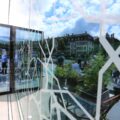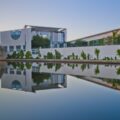House of One: What is driving Europe’s newest interfaith project?
House of One: What is driving Europe’s newest interfaith project?
Construction of Berlin’s ‘House of One’ has begun, with celebration and much optimism. But the project comes at a time of escalating tensions between faiths across Europe and the world. So are its ambitions realistic? And are there any conflicts of interest that might arise?
In summer 2021, an imam, a rabbi, and a priest laid the foundation stone of Europe’s biggest interfaith project. When it opens in four years’ time, the ‘House of One’ will incorporate a mosque, a synagogue, and a church. It will also include a central space where people of all three faiths and none can come together to discuss and pray.[1]
Situated in the heart of Berlin, the project’s symbolism as a point of interfaith unity is unmistakable. But who is driving this project, and what motivates them? Furthermore, are there any potential conflicts of interest that participants should be aware of?
Theological vision
This project is the brainchild of three founders, each a leader of their own religion: Gregor Hohberg, a Christian pastor; Kadir Sanci, an imam; and Tovia Ben Chorin, a rabbi. For all three, their faith is the primary motivation for this project.[2]
The project is not intended to create watered-down versions of each faith; nor is it supposed to conclude that all three religions are necessarily worshipping the same deity. Rather, believers will grow in knowledge and respect of other faiths.[3] “The people there will remain true to their own faith, live by its strength and enter into peace-loving conversation with one another,” says Gregor Hohberg.
The building’s architecture reflects this vision. Three separate prayer spaces are connected by a central meeting space where people of any faith and none can meet together to commune, share stories, and, if appropriate, pray. The three equal faiths, each maintaining its own integrity and distinctiveness, are united in their openness to learn from and engage with the other faiths.
The building is situated on the site of a 13th-century church, which was badly damaged during the Second World War and demolished under communist rule in 1964.[4] A place of peace and mutual respect between peoples will grow out of a place bearing the scars of war and ideological intolerance.[5]
Social impact
Berlin also holds particular significance as a city from which extreme hatred against a religious group emerged and was propagated. Rabbi Tovia speaks movingly about how Berlin is for him both the ‘city of wounds’ and the ‘city of wonders’.[6] It was the heart of the Nazi machine that exterminated 6 million Jews, LGBT people, and others considered enemies of the state. However, in the House of One, we now see the healing of these wounds emerging from the same place. The three religions that shaped the course of European civilisation are now united around their shared identity as people of faith.[7]
The reappearance of fighting between Israel and Hamas in May 2021 sparked a wave of anti-Israel protests across Europe, including Germany.[8] So shocking was this resurgence of antisemitism within living memory of the Nazi regime that German authorities banned the Hamas flag out of solidarity with its Jewish citizens.[9]
This venture comes at a time of widespread Islamophobia across Europe. A 2019 poll found that over 50% of Germans consider Islam to be a ‘threat’, which is consistent with data from the previous decade.[10] Legitimate criticism of aspects of Islam that seem to undermine gender equality, democracy, or LGBTQ rights, often collapses into discrimination against Muslims, or even hate crimes.[11] The House of One will be the first mosque located in the centre of Berlin.[12]
With this backdrop of growing intolerance, it is no wonder that education is a priority for the House of One.[13] Even though the building will not be finished until 2026, the project is already engaging with schools across the country, asking students to reflect on the theme of ‘tolerance’. The team of educators brings a range of skills including mediation, therapy, and ‘democracy and peace education’. The team hopes to work with communities, schools, and faith groups to increase mutual understanding and open-mindedness, which is the key to enriching encounters with people of other faiths.[14]
Sources of funding
At a cost of 47.3 million euros, the House of One has required a lot of fundraising to get off the ground. Their major donors are the German federal government and the state of Berlin, who are contributing 30 million euros between them.[15] The project has also qualified for several smaller federal- or state-funded grants, including those supporting democracy and urban growth in Germany. Furthermore, the mayor of Berlin has been made the chairperson of the Board of Trustees.[16]
The German Evangelical Church is also a major donor, though the amount of their donation is not freely accessible. No major donors from Muslim or Jewish organisations are visible on their website.[17]
The House of One also welcomes donations from individuals. People can ‘sponsor a brick’ for 10 euros,[18] for which they receive a ‘blessing’. Donors can also make prayer requests which become part of the liturgical cycle of the faith communities.[19]
Conflicts of interest?
With well over half of their donations coming from German authorities, can the House of One be considered ‘independent’ from the federal and state governments? Would they feel free to criticise a decision of the country’s leadership, or to call out abuses? This question of independence is all the more pressing considering that their trustees are led by Berlin’s mayor.
Similarly, what degree of influence will the Evangelical Church enjoy over the project? As the only Christian denomination to make a substantial donation, will their doctrines and concerns be granted priority over those of the Catholics, for example? More concerningly for the House of One’s mission, will the (apparent) fact that Christians have donated more than Jews or Muslims at all affect the project’s direction?
The distinction between support and influence is blurry at best. While donors may give altruistically, it is a (cynical) principle of capitalism that investors invest in the expectation of some return. The House of One leadership would do well to think about these hypothetical questions before they become a reality.
Interested in similar topics? Go to our Dashboard and get free updates.
Sources
[1] House of One: Berlin lays cornerstone for a place for religious understanding
[2] House of One: The Initiators
[4] House of One: Berlin lays cornerstone for a place for religious understanding
[5] ‘House of One’: Berlin lays first stone for multi-faith worship centre
[6] House of One: The Initiators
[7] House of One: The Initiators
[8] Anti-Israel protests in Germany prompt calls for antisemitism crackdown
[9] German government agrees to ban Hamas flag after anti-Semitic incidents
[10] Religious tolerance is widespread – but it does not extend to Islam
[11] There’s a social pandemic poisoning Europe: hatred of Muslims
[12] House of One: Berlin lays cornerstone for a place for religious understanding
[13] House of One: The Education
[14] House of One: The Education
[15] Christians, Muslims and Jews to share faith centre in Berlin
[16] House of One: Which external control bodies are accompanying the project?
[17] House of One: Sponsors and Supporters
[18] Come and build the House of One
[19] House of One: Which external control bodies are accompanying the project?






